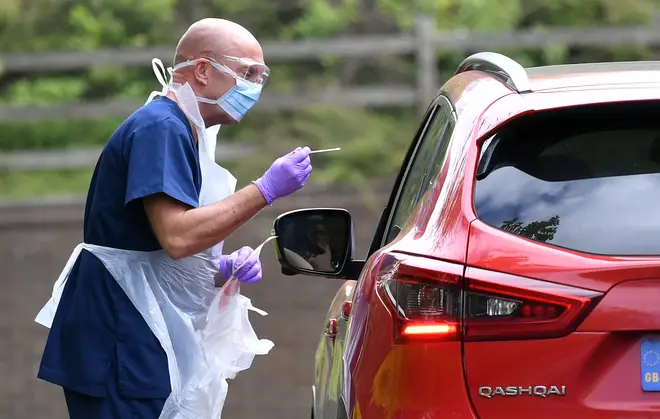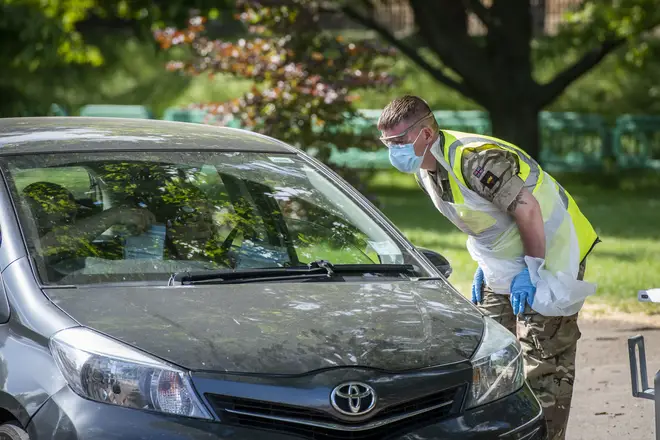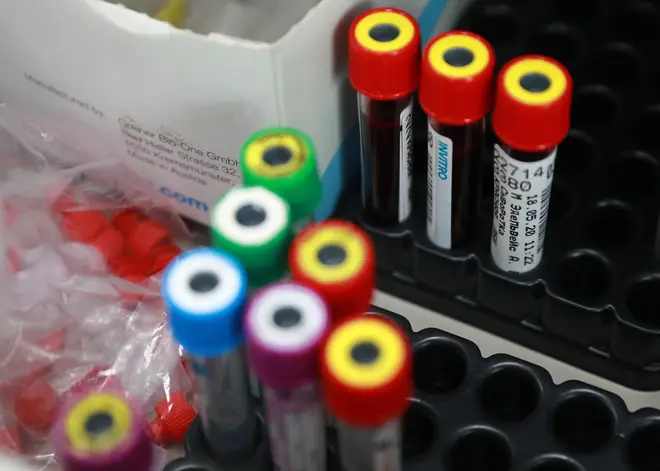
Ali Miraj 12pm - 3pm
18 May 2020, 14:28

Doctors have accused the government of an "eight week delay" in putting the loss of taste or smell on the list of official coronavirus symptoms.
On Monday, government scientists added the loss of taste and smell to the criteria for deciding whether someone has Covid-19, encouraging those with anosmia to self-isolate.
The UK's four Chief Medical Officers have updated the coronavirus symptoms list adding the loss of sense of smell or taste as an indicator of infection.
But the British Rhinological Society and ENT UK today released a joint statement criticising the government and PHE for the length of time it has taken for anosmia to be recognised as a symptom.
They also said that this has caused problems for key workers who may be suffering with the virus, stating "key workers, often dealing with vulnerable groups, are told they must still go to work as they do not meet the criteria for diagnosis."
"At the time of writing, NHS 111 declares 'it is unlikely you have COVID-19' unless you have a cough or fever; loss of sense of smell and taste, myalgia, fatigue and gastrointestinal upset are all disregarded.

Professor Claire Hopkins, President of the British Rhinological Society and Professor Nirmal Kumar, President of ENT UK said: "It is nearly eight weeks since ENT UK and the BRS issued a press release alerting physicians globally to the risk that patients presenting with isolated anosmia may be suffering with COVID-19 infection.
"We advised that patients with new-onset anosmia should be advised to self-isolate in order to reduce the risk of transmission by otherwise asymptomatic carriers of infection. At the time of writing the original press release, evidence was largely anecdotal.
"Since then physicians and researchers have produced overwhelming evidence through international collaboration to show that loss of sense of smell (with or without loss of taste) is one of the most prevalent symptoms of COVID-19, and that it is also a highly specific marker, better than both cough or fever in this respect."

Listen & subscribe: Global Player | Apple Podcasts | Google Podcasts | Spotify
The statement continued: "It is now recognised by the World Health Organisation and the Centre for Disease Control in the United States. As lockdown restrictions are eased, we are told repeatedly by Public Health England of the need to 'track and trace' infection. We have been in regular contact with PHE regarding the utility of anosmia as a marker of infection.
"However, anosmia is not yet included in the list of associated symptoms used by the NHS 111 service.
"In the face of the current evidence base, this now amounts to clinical negligence.
"We remain confident in our earlier assertion that, during the current COVID-19 pandemic, a patient presenting with new-onset anosmia, in the absence of a head injury or nasal obstruction, should be considered likely to have COVID-19 infection.
"Patients should be advised to self-isolate and considered for confirmatory testing if available. The criteria used by Public Health England must be changed without further delay."
Nurse Freya Langdale, 29, a community psychiatric nurse working in Lewisham, south east London, also hit out at the delay. She believes she caught Covid-19 at the end of March just as the country was going in to lockdown.
Three days after meeting two friends she became tired and lethargic before noticing a change in her senses while cooking a meal with her boyfriend who she went to stay with.
"We were cooking a curry with loads of spices and stuff, and my boyfriend said it smelt really nice and then I realised that I couldn't actually smell it at all," she said.
"I couldn't smell or taste anything for about three days."
She did not develop a cough, might have had a mild temperature, but otherwise had no "extreme" other symptoms.
Ms Langdale was not tested for the virus, but one of the friends she was last with also lost her sense of taste and smell at the same time.
Meanwhile the other friend, who Ms Langdale lives with, developed bad Covid-19 symptoms and was told by the NHS 111 service she likely had caught the virus.
Ms Langdale described the loss of taste and smell as "really strange" leaving food with "absolutely no flavour at all".
"It's very odd eating things and just being able to feel the texture rather than the taste," she added.
A cautious Ms Langdale isolated herself for two weeks, despite official health guidance listing key coronavirus symptoms as a high temperature and new continuous cough.
Asked about a loss of taste and smell now being added to the NHS list she said: "I think it is a bit frustrating", adding: "I'm a nurse and working with patients, we were told: 'Oh it's only if you have a temperature or a cough then if you don't have that then you can come in'".
Ms Langdale, who is now waiting for an antibody test, feels this early guidance was possibly "misleading" and might have helped the virus "spread a lot quicker".
She added: "I remember looking on the NHS website for advice and it still said if you have a temperature or a cough then stay at home.
"But really I could have gone out and about with just my loss of taste and smell and probably spread it to god knows who.
"Probably not the best advice given by the Government."

LBC News correspondent Alex Jensen takes a coronavirus test
The US Centers for Disease Control and Prevention and the World Health Organization, along with France have all added the loss of smell and taste to their official lists of coronavirus symptoms.
England's deputy chief medical officer, Professor Jonathan Van-Tam said the move would mean 93 per cent of cases where people have symptoms are now picked up, a rise from 91 per cent previously.
In a letter, the four Chief Medical Officers said: “From today, all individuals should self-isolate if they develop a new continuous cough or fever or anosmia.
“Anosmia is the loss or a change in your normal sense of smell. It can also affect your sense of taste as the two are closely linked.
“We have been closely monitoring the emerging data and evidence on Covid-19 and after thorough consideration, we are now confident enough to recommend this new measure.”

Police extinguish beach BBQ in Hove amid Coronavirus lockdown
On Monday, Professor Tim Spector, head of the department of genetic epidemiology and leader of the Covid symptom study app at King's College London, said 50,000 to 70,000 people in the UK with Covid-19 are not being told to self-isolate.
He said the NHS was failing to track all symptoms of coronavirus, including loss of taste and smell.
"We list about 14 symptoms which we know are related to having a positive swab test, and these are not being picked up by the NHS."
He said 17 other countries including the US had altered their list of symptoms, but not the UK.
The UK's overall coronavirus death toll remains the highest in Europe at 34,636. On Sunday, the daily figure for coronavirus deaths dropped to 170, the lowest number since lockdown began.